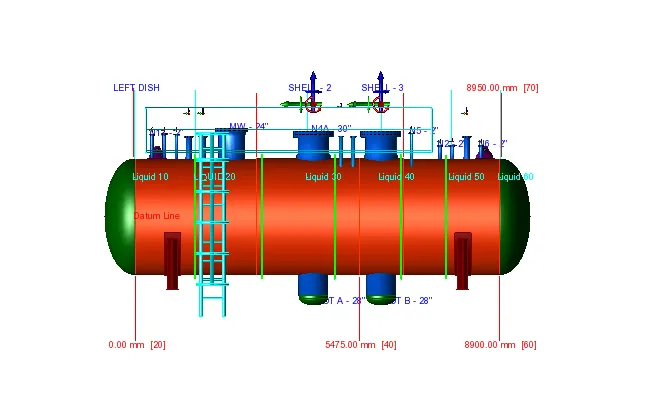
Menu
The “Pressure Vessels Design: Principles, Codes, and Practices” course offers comprehensive training on the design, construction, and maintenance of pressure vessels used in various industrial applications. Participants will learn about the fundamental principles of pressure vessel design, relevant codes and standards, material selection, fabrication techniques, and quality assurance practices to ensure safety, reliability, and compliance.
- Understanding Pressure Vessel Design: Gain knowledge of the principles and factors involved in pressure vessel design.
- Codes and Standards: Familiarize with international codes and standards governing pressure vessel design and construction.
- Material Selection: Learn about materials used in pressure vessel construction and factors influencing material selection.
- Fabrication Techniques: Understand fabrication methods, welding procedures, and quality control measures.
- Safety and Compliance: Acquire awareness of safety considerations, regulatory requirements, and quality assurance practices for pressure vessels.
Introduction to Pressure Vessels:
- Definition and types of pressure vessels: cylindrical, spherical, and non-cylindrical vessels
- Applications of pressure vessels in various industries: oil and gas, chemical, petrochemical, and power generation
Pressure Vessel Design Principles:
- Pressure vessel design factors: internal pressure, external loads, temperature, and material properties
- Design considerations for stress analysis, fatigue, and corrosion
- ASME Boiler and Pressure Vessel Code (BPVC) overview
Codes and Standards:
- Overview of international codes and standards: ASME BPVC, API, EN, PED, and TEMA
- Compliance requirements for pressure vessel design, fabrication, inspection, and testing
- Interpretation and application of code requirements
Material Selection:
- Properties and characteristics of materials used in pressure vessel construction: carbon steel, stainless steel, alloy steel, and non-ferrous metals
- Factors influencing material selection: pressure, temperature, corrosive environment, and fabrication requirements
Fabrication Techniques:
- Welding processes and procedures for pressure vessel fabrication: SMAW, GTAW, GMAW, and FCAW
- Heat treatment and post-weld heat treatment (PWHT) considerations
- Non-destructive testing (NDT) methods: radiographic testing, ultrasonic testing, magnetic particle testing, and dye penetrant testing
Quality Assurance and Inspection:
- Quality control measures during fabrication and assembly
- Inspection and testing procedures for pressure vessels: hydrostatic testing, pneumatic testing, and visual inspection
- Documentation and record-keeping practices
Safety Considerations:
- Safety hazards associated with pressure vessels: overpressure, leakage, brittle fracture, and corrosion
- Safety devices and relief systems: pressure relief valves, rupture discs, and pressure gauges
- Emergency response protocols and procedures
Case Studies and Practical Applications:
- Real-world examples of pressure vessel design, construction, and operation
- Hands-on exercises in stress analysis, material selection, and code compliance
- Group discussions on best practices and lessons learned
By the end of this course, participants will:
- Have a thorough understanding of pressure vessel design principles, codes, and standards.
- Be able to select appropriate materials and fabrication techniques for pressure vessel construction.
- Understand safety considerations, regulatory requirements, and quality assurance practices for pressure vessels.
- Acquire practical skills in stress analysis, material selection, and code compliance.
- Be prepared to contribute to the design, construction, and maintenance of pressure vessels in industrial settings.
This course is suitable for:
- Mechanical Engineers
- Process Engineers
- Pressure Vessel Designers
- Fabrication Engineers
- Quality Control Inspectors
- Maintenance Technicians
- Regulatory Compliance Officers
Enroll Now
To enroll in the “Pressure Vessels Design: Principles, Codes, and Practices” course,, visit our course registration page or contact our course coordinator at [email protected]

Get In Touch!
Contact us for a quote or in case of any urgent queries please send us an email on: [email protected]
we will get back to you right away!